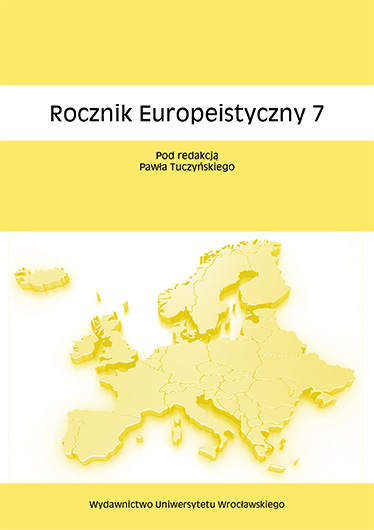Rocznik Europeistyczny
The Annals of European Studies
Publishing House: Wydawnictwo Uniwersytetu Wrocławskiego
Subject(s): Politics / Political Sciences, History, Social Sciences
Frequency: 1 issues
Print ISSN: 2450-274X
Status: Active
- 2019
- 2020
- 2022
- Issue No. 5
- Issue No. 6
- Issue No. 7
Articles list
{{ article.TitleOriginalLanguage }}
{{ article.TitleOriginalLanguage }}
({{ article.TitleEnglish }})
- Publication: {{ article.Publisher }} ({{ article.Issue }})
- Author(s): {{ article.Authors }}
- Contributor(s): {{ article.Contributors }}
- Language: {{ article.Language }}
- Subject(s): {{ article.Subjects }}
- Issue: {{ article.Issue }}
- Page Range: {{ article.PageRange }}
- No. of Pages: {{ article.NumberOfPages }}
- Keywords: {{ article.Keywords }}
- Summary/Abstract: {{ article.SummaryAbstract }}
- Price: {{ common.currency(article.Price) }}
Short Description
“Rocznik Europeistyczny” (The Annals of European Studies) is a journal in which we are planning to publish papers devoted to European Studies, that is, studies of both the Europe that “should be united” and into that part of Europe that has already been united. It is clear that the papers will address issues within the fields of politics, law, history, economics, cultural studies and related disciplines.
Above all, the journal will prefer those papers, studies and scientific contributions that will fulfil the tasks connected with the mission of European Studies: studies on the European civilisation and cultural area, on the political and cultural area (European Studies in the broad sense) as well as on the European Union and its areas of activity/policies (European Studies in the narrow sense); areas constituting the particular domain of Europeanist knowledge.
“The Annals of European Studies” thereby wish to reflect the conviction that the community of Europeanists, starting from studies from the perspectives of political science, social science, economics, law, history, etc., has developed a subject matter that is proper to European Studies and described in the Europeanist language (as evidenced by numerous Europeanist lexicons), with a specific catalogue of research topics; that it has developed its own specificity of European Studies, justifying the statement that European Studies have achieved a high degree of identity.

